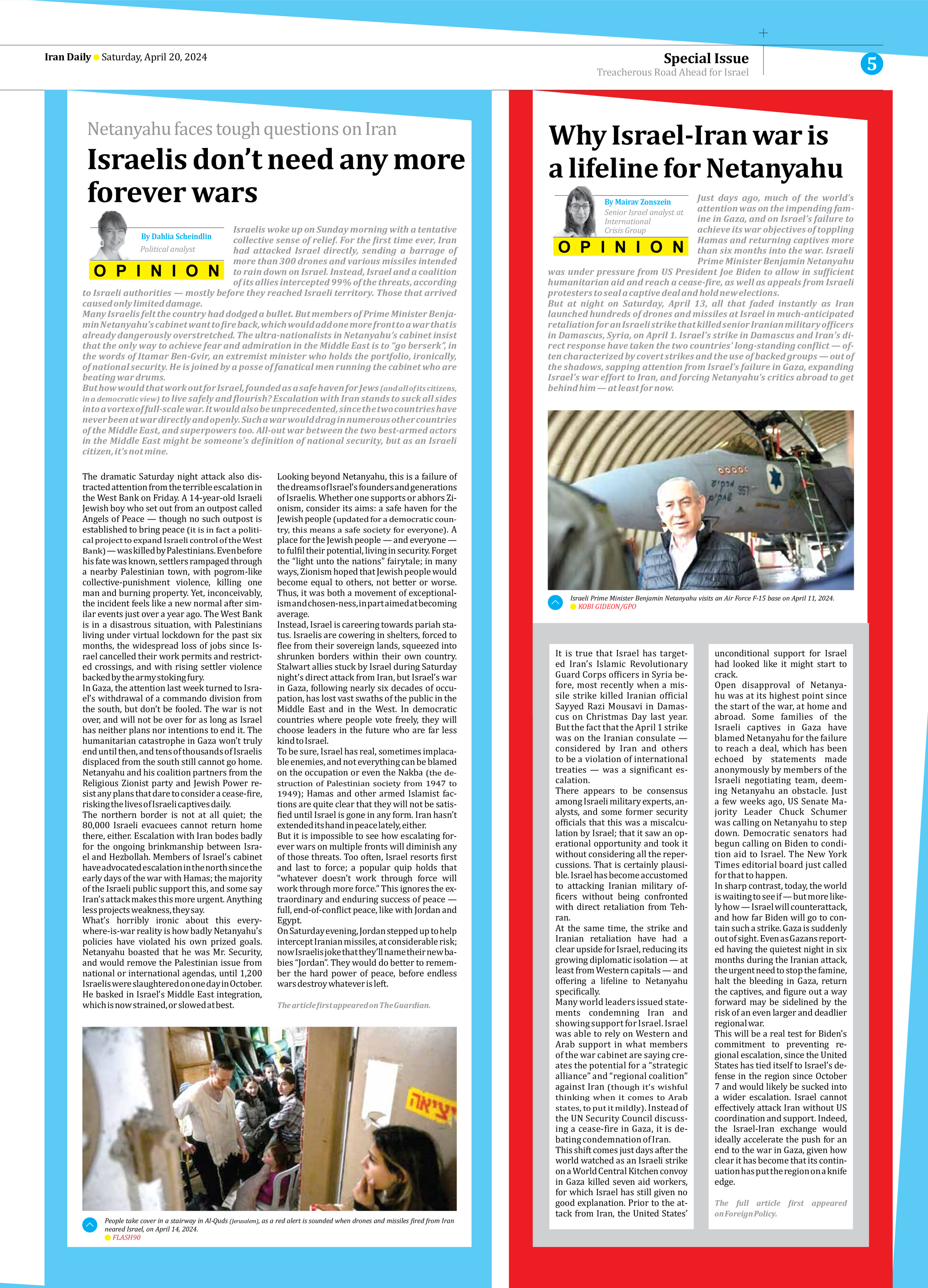
Why Israel-Iran war is a lifeline for Netanyahu
Just days ago, much of the world’s attention was on the impending famine in Gaza, and on Israel’s failure to achieve its war objectives of toppling Hamas and returning captives more than six months into the war. Israeli Prime Minister Benjamin Netanyahu was under pressure from US President Joe Biden to allow in sufficient humanitarian aid and reach a cease-fire, as well as appeals from Israeli protesters to seal a captive deal and hold new elections. But at night on Saturday, April 13, all that faded instantly as Iran launched hundreds of drones and missiles at Israel in much-anticipated retaliation for an Israeli strike that killed senior Iranian military officers in Damascus, Syria, on April 1. Israel’s strike in Damascus and Iran’s direct response have taken the two countries’ long-standing conflict — often characterized by covert strikes and the use of backed groups — out of the shadows, sapping attention from Israel’s failure in Gaza, expanding Israel’s war effort to Iran, and forcing Netanyahu’s critics abroad to get behind him — at least for now.
By Mairav Zonszein
Senior Israel analyst at International
Crisis Group
It is true that Israel has targeted Iran’s Islamic Revolutionary Guard Corps officers in Syria before, most recently when a missile strike killed Iranian official Sayyed Razi Mousavi in Damascus on Christmas Day last year. But the fact that the April 1 strike was on the Iranian consulate — considered by Iran and others to be a violation of international treaties — was a significant escalation.
There appears to be consensus among Israeli military experts, analysts, and some former security officials that this was a miscalculation by Israel; that it saw an operational opportunity and took it without considering all the repercussions. That is certainly plausible. Israel has become accustomed to attacking Iranian military officers without being confronted with direct retaliation from Tehran.
At the same time, the strike and Iranian retaliation have had a clear upside for Israel, reducing its growing diplomatic isolation — at least from Western capitals — and offering a lifeline to Netanyahu specifically.
Many world leaders issued statements condemning Iran and showing support for Israel. Israel was able to rely on Western and Arab support in what members of the war cabinet are saying creates the potential for a “strategic alliance” and “regional coalition” against Iran (though it’s wishful thinking when it comes to Arab states, to put it mildly). Instead of the UN Security Council discussing a cease-fire in Gaza, it is debating condemnation of Iran.
This shift comes just days after the world watched as an Israeli strike on a World Central Kitchen convoy in Gaza killed seven aid workers, for which Israel has still given no good explanation. Prior to the attack from Iran, the United States’ unconditional support for Israel had looked like it might start to crack.
Open disapproval of Netanyahu was at its highest point since the start of the war, at home and abroad. Some families of the Israeli captives in Gaza have blamed Netanyahu for the failure to reach a deal, which has been echoed by statements made anonymously by members of the Israeli negotiating team, deeming Netanyahu an obstacle. Just a few weeks ago, US Senate Majority Leader Chuck Schumer was calling on Netanyahu to step down. Democratic senators had begun calling on Biden to condition aid to Israel. The New York Times editorial board just called for that to happen.
In sharp contrast, today, the world is waiting to see if — but more likely how — Israel will counterattack, and how far Biden will go to contain such a strike. Gaza is suddenly out of sight. Even as Gazans reported having the quietest night in six months during the Iranian attack, the urgent need to stop the famine, halt the bleeding in Gaza, return the captives, and figure out a way forward may be sidelined by the risk of an even larger and deadlier regional war.
This will be a real test for Biden’s commitment to preventing regional escalation, since the United States has tied itself to Israel’s defense in the region since October 7 and would likely be sucked into a wider escalation. Israel cannot effectively attack Iran without US coordination and support. Indeed, the Israel-Iran exchange would ideally accelerate the push for an end to the war in Gaza, given how clear it has become that its continuation has put the region on a knife edge.
The full article first appeared
on Foreign Policy.







